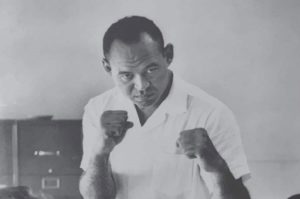Ringside Report Looks Back at Boxer & Civil Rights Icon Norvel Lee
 By Donald “Braveheart” Stewart
By Donald “Braveheart” Stewart
It’s an iconic image that has vulnerability emblazoned across it, not in words, but in the fact that a small child, a small black child, is sitting prim and correctly on a bus. But she is in the wrong seat. She should be in a seat for her color.
Little Rosa Parks is a symbol for eternity.
Of course, she was not the only one.
There were some other people who chose to stand up to the idea of segregation by also sitting on the wrong seat at the wrong time for all the right reasons. I know of at least one. But of course, a heavyweight boxer defying the authorities as not quite as powerful an image.
It would not be long before the authorities had their fill of black, single minded, over opinionated and vocal, heavyweight boxers. But for Norvel Lee, his defiance carried real weight – and not just in terms of his size – but legal poundage.
Many asked, who does he think he is, but here is precisely who he was.
Norvel Lee was the type of man who deserved respect. His boxing career was entirely in the amateur code, with a record believed to have been 100 wins, and 5 losses. Lee claimed that he was a boxer, not a puncher and that he did not feel he had the right mix of skills to make it professionally.
Born in 1924, in Eagle Rock, Virginia, Lee also served. He was a World War II veteran. His boxing prowess after the war gained him many admirers and when he won bronze in the 1951 Pan American games it was clear he was a decent pugilist.
How decent was just one year away when he went to Helsinki and at the Olympic Games, won gold, at the age of 27, in the light heavyweight division. His abilities were recognized with the Val Barker Trophy for the best boxer of the Olympics.
His early years had clearly been spent in the segregation which was prevalent of his childhood. Educated at the Academy Hill School for Negroes that he went on to serve a country, which did not serve him quite as well, was remarkable. He left the Army Air Force as a Lieutenant Colonel, having served on the Pacific.
He came out of the armed forces to gain a degree from Howard University. He then found some traction in his amateur boxing career. Helsinki was not his first Olympics and he had been part of the 1948 squad though lost out to Jay Lambert in the Olympic trials. The same year he represented the USA at the Pan American Games, he won the New York City and the Chicago Golden Gloves. The 1952 Olympics were notable for the US team bringing home five golds, including one for a 17-year-old Floyd Paterson who Lee mentored. He was taken as a reserve for the heavyweight division but told if he could make the weight he could fight in the light heavyweights. He shed 12 pounds and made the weight!
Argentina’s Antonio Pacenza fought him in the final which Lee won and brought home the gold!
He did not box after the Olympics until he went into the ring for the Pan American Games in 1955 and repeated his feat of four years earlier and won bronze.
After Lee retired as an amateur boxer, he took on a variety of administrative roles within the sport. He even rose to be a member of the executive board of the WBC for four years. As a man who knew the benefit of good administration he worked in the penitentiary system and supported the development of education programs in a variety of roles until he retired but before he won a thing, before he went to the Olympics or the Pan American Games, Lee had a bigger battle which he won…
His fight with the authorities came in 1948. Some 7 years before Rosa Parks gained prominence. In a train, and on returning to Eagle Rock Lee sat in an all-white carriage.
He refused to leave his seat.
He was arrested for violating the Jim Crow laws.
He was found guilty and fined $5.
He appealed to the Circuit Court.
They increased his fine to $12.
He appealed to the Virginia State Supreme Court.
His guilty verdict was overturned.
Norvel Lee won his landmark case.
He then went on to proudly represent his country.
In 1992, pancreatic cancer claimed him but what a legacy, what a fighter, what an unknown icon.

